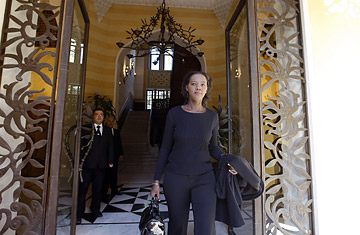
Rama Yade, France's junior Minister of Sports
She was once the star of the French government and an icon of racial diversity near the summit of power. But now Rama Yade — the Senegal-born minister whom President Nicolas Sarkozy once called "my Condi Rice" — has angered her boss, alienated colleagues and fallen into such disgrace that her ejection from the cabinet is virtually certain during a shake-up next spring. About the only thing not failing Yade these days is public opinion — which continues to rank the outspoken 32-year-old higher than any of the politicians now yearning for her ouster.
Yade, the junior Minister of Sports, is under fire for breaking ranks and criticizing a government decision to roll back tax breaks for professional athletes. Though heartfelt, Yade's contrarian stand made for bad politics — something her peers have made painfully clear. Junior Minister for Family Affairs Nadine Morano told a newspaper that if Yade didn't "agree with government policies, [she] should shut [her] trap or resign."
Statements attributed to Elysée officials have faulted Yade's "whims" and noted her "difficulty in being a member of any kind of team." In a Nov. 5 interview with Le Monde, Prime Minister François Fillon made comments that observers have interpreted as telegraphing Yade's eviction notice from the government once regional elections are over next March. "The junior minister of sports did not demonstrate unity with the government. I told her so, [and] there must be consequences for that," Fillon said. "The Fifth Republic and its institutions are very subtle and only function if everyone remains in their place."
But making a place for minorities was one of the reasons that Sarkozy named Yade to government in the first place. Alongside Justice Minister Rachida Dati, the daughter of immigrants from Algeria and Morocco, Yade serves as living proof of Sarkozy's promise that there is room for capable, energetic people of all races in French politics — and at every level of French life. Dati and Yade quickly became fixtures in France's media, favorites in public-opinion polls and darlings of the image-conscious Sarkozy. After Sarkozy named the women to his first cabinet in May 2007, however, the ambitious Dati wound up creating problems and public embarrassments for Sarkozy through her haughty public behavior, authoritarian management of her ministry (which provoked a chain of resignations) and a hunger for media attention rivaling the President's. She lost her cabinet post last June after Sarkozy forced her to seek a seat in the European parliament.
Yade has also run afoul of Sarkozy — usually by speaking her mind in a manner that infuriates government colleagues as much as it thrills the French public. When Sarkozy prepared to greet Libyan leader Muammar Gaddafi in 2007, for example, a visibly disgusted Yade — then serving as the Secretary of State for Foreign Affairs and Human Rights — warned that "Gaddafi must realize our country isn't a doormat upon which a leader, whether terrorist or not, can come to wipe off the blood of his crimes." And while Dati knuckled under to Sarkozy's order to run for the European parliament, Yade flatly refused.
The final straw apparently came last month, as the Elysée fought to quell accusations of nepotism around a bid by Sarkozy's son to attain an influential public job. As fellow cabinet members rejected any suggestion of favoritism or conflict of interest in the younger Sarkozy's move, Yade noted that the affair didn't look innocent to the public. "We must not give the impression that there is a gap between the protected élites and the little people," she said.
That kind of refreshing talk has made Yade a favorite — a status that has been enhanced by speculation that she may not be long for the government. A poll released on Nov. 11 found Yade topping the list of all politicians "who should play a large role in the coming months." "Sarkozy has suffered a series of embarrassing controversies — including the accusations of nepotism — that have eroded the support of his traditionalist voter base worried about values, honesty and responsibility," says Jean-Marc Lech, co-president of the polling company Ipsos. "Rama Yade is popular with those voters and others for appearing open, honest and ready to stick to her principles. That's making it hard for Sarkozy to get rid of her, especially since she's one of the last visible people he turned to [in order] to create a racially diverse cabinet."
Given Sarkozy's long record of advocating increased diversity and better opportunities for minorities in France — including a call for U.S.-style affirmative action — nobody can accuse the President of cynically using Dati and Yade as token members of his government. But both women forged such strong characters and opinions in taking on prejudice as they made their way up France's political ladder that it is puzzling as to why Sarkozy should be surprised when they stick to their guns once they make it to the top. Indeed, Yade's willingness to go against the current is the main reason that she, like Dati before her, is such a public favorite. It's her attitude rather than her skin color that voters appreciate most. And that's an asset Sarkozy might be wise to exploit when he finalizes his cabinet changes next spring.
